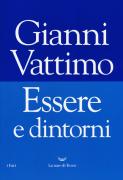Essere e dintorni

Gianni Vattimo, one of Europe's foremost contemporary philosophers and most famously associated with the concept of weak thought, explores theoretical and practical issues flowing from his fundamental rejection of the traditional Western understanding of Being as an absolute, unchanging, and transcendent reality. The essays in this book move within the surroundings of Being without constructing a systematic, definitive analysis of the topic.
In this book, Vattimo continues his career-long exploration of the philosophy of Martin Heidegger, in particular his repudiation of metaphysics with its presupposition of the existence of permanent, universal truth, and that of Friedrich Nietzsche, with its promotion of nihilism. One consequence of problematizing the idea of an attainable truth is the relativization of values and cultures. In the face of the death of God - or the absence of a transcendent guarantor of the validity of human judgments - we have the postmodern tendency to see all value systems and assertions of truth as purely subjective, and to suggest that "anything goes," which Nietzsche called passive nihilism. Vattimo advocates a more active response as he challenges all forms of authoritarianism in the world today. He brings his intellectual acumen to bear on such urgent issues as globalization, the clash of civilizations and terrorism, the crisis of democracy, and the relevance of orthodox religion.
Rather than endorse dogmatism or indifference and detachment from social engagement in the name of relativism, Vattimo opts for the path of meaningful dialogue and a search for a mediated consensus based on reason, with all its limitations.